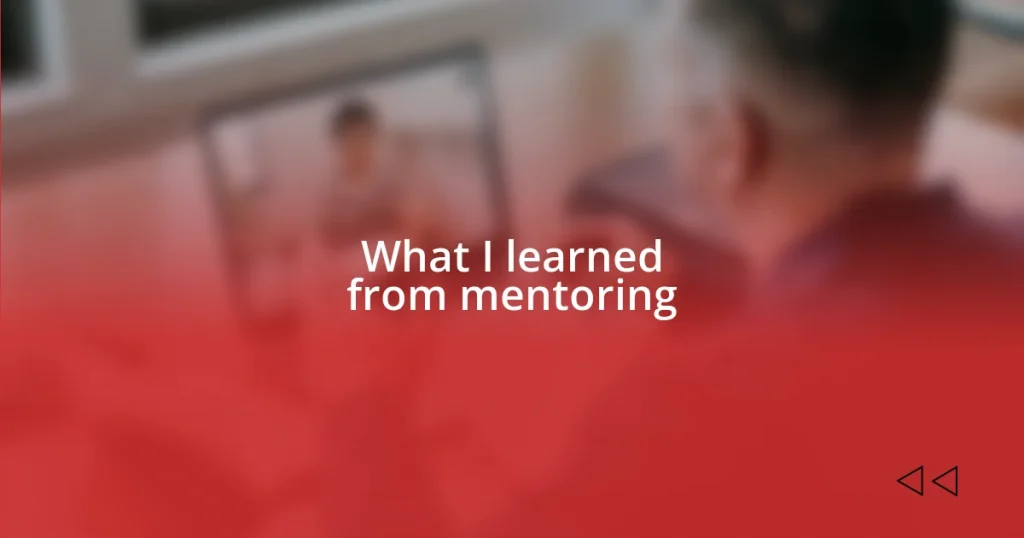Key takeaways:
- Active listening and creating a safe space for open dialogue are essential for effective mentoring and can lead to transformative connections.
- Setting clear, measurable goals collaboratively fosters mutual understanding, accountability, and enhances the mentoring relationship.
- Embracing vulnerability, flexibility, and patience allows mentors to better connect with mentees and nurtures their growth and self-confidence.
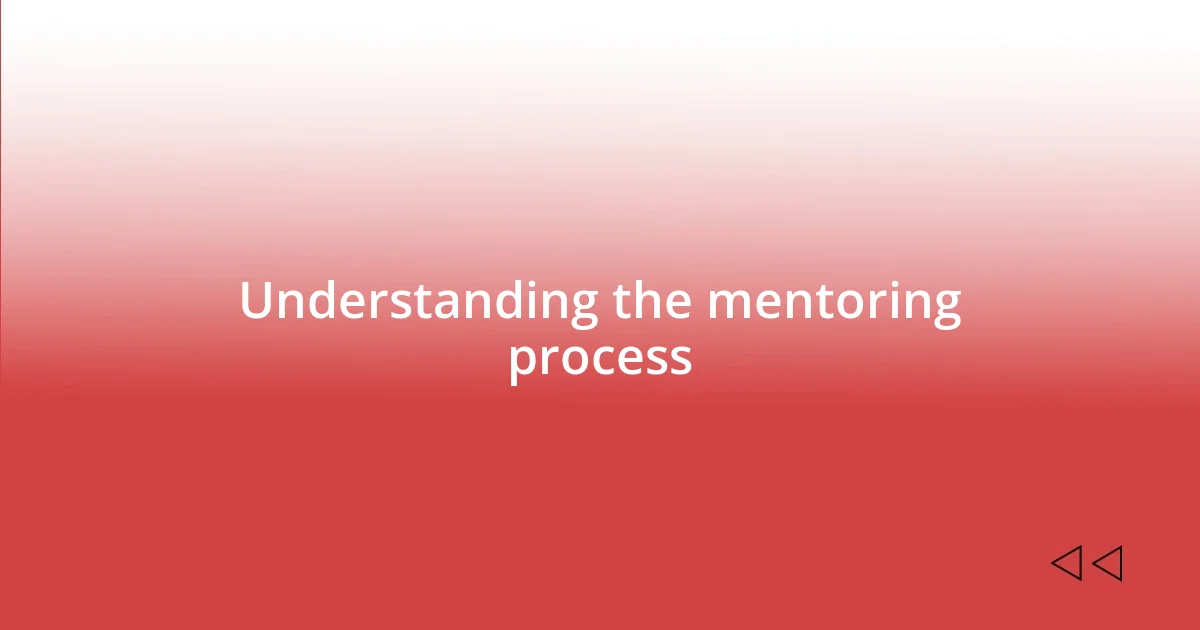
Understanding the mentoring process
Understanding the mentoring process is like navigating a shared journey where both the mentor and mentee grow together. I remember my first time mentoring someone; it felt a bit like being a guide in an unfamiliar landscape. How could I help them find their path when I was still discovering mine? That realization made me appreciate the delicate balance between offering guidance and allowing them space to explore.
One key aspect I’ve learned is the importance of active listening. There was a moment during a session when my mentee shared a struggle they were facing at work. Instead of jumping in with solutions, I focused on truly hearing them out. It struck me how powerful it is to create a safe space where they feel comfortable expressing themselves. Have you ever noticed how much clarity can emerge just from talking things out? That feeling of connection can be transformative.
The mentoring process is also about setting realistic expectations. I vividly remember a mentee expecting instant results, and seeing their frustration made me reflect on the nature of growth. Change often happens in small, incremental steps, and as mentors, it’s our task to help them recognize and celebrate those milestones. So, how can we best support them along this journey? By consistently checking in and ensuring they feel valued and capable every step of the way.
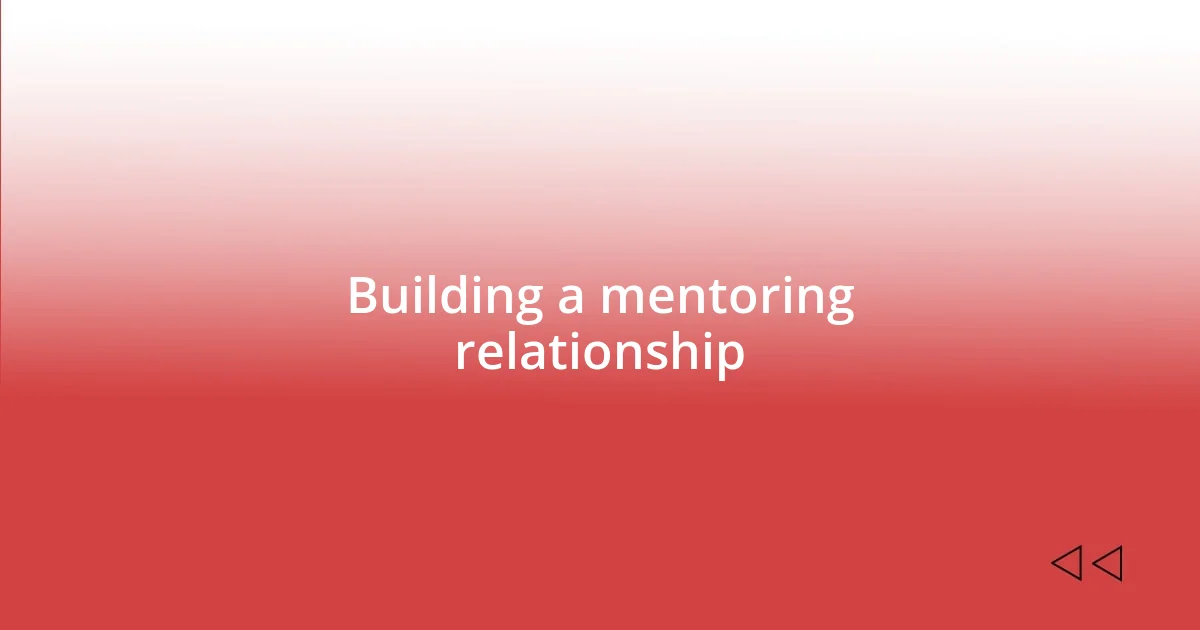
Building a mentoring relationship
Building a mentoring relationship requires mutual respect and understanding. I remember how vital it was for me to establish trust with my mentee right from the start. I would often share my own experiences, including some struggles I faced early in my career, which helped create a bond. It made me wonder—what does trust really mean in a mentoring context? For me, it means knowing we can be honest and vulnerable with each other.
Creating a supportive environment is equally important. I had a mentee who felt unsure about their capabilities. There was a moment when I encouraged them to take on a small project that seemed daunting. Watching their confidence grow after they succeeded was a beautiful reminder of the potential within us when we step outside our comfort zones. How do we nurture that potential? By celebrating small wins together and providing constructive feedback in a way that feels uplifting rather than critical.
Ultimately, effective communication plays a critical role in building a mentoring relationship. I learned the hard way about the misalignment of expectations. After discussing a project, I thought we were on the same page, but my mentee had a different interpretation. Taking time to clarify our goals, and asking questions to ensure understanding helped us avoid misunderstandings. So, how can we ensure our communication is productive? I prioritize regular check-ins and encourage an open dialogue where both of us can share feedback freely.
| Aspect | Details |
|---|---|
| Trust | Building trust involves sharing personal experiences and fostering honesty. |
| Supportive Environment | Encouragement and celebrating milestones can boost a mentee’s confidence. |
| Effective Communication | Regular check-ins and clarifying goals help prevent misunderstandings. |
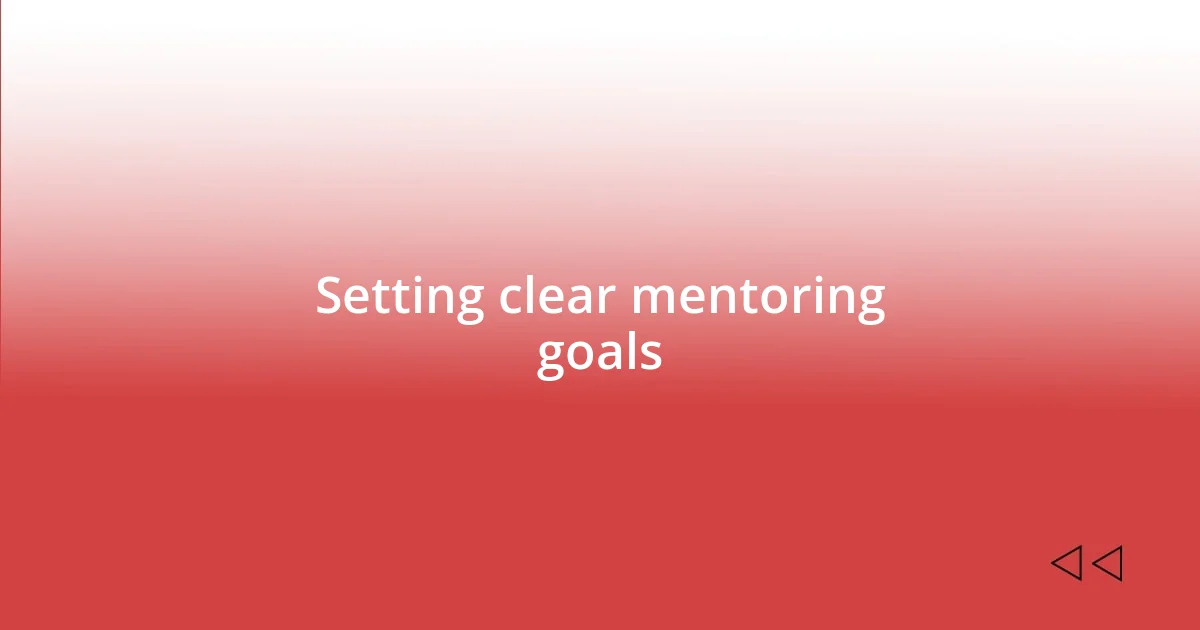
Setting clear mentoring goals
Setting clear mentoring goals is a crucial first step to ensure a productive mentoring experience. During one of my mentoring relationships, we spent our initial meetings discussing what each of us wanted to achieve. It was surprising to see how different our expectations were at first. By setting specific, measurable goals together, we created a roadmap that kept us focused. That shared vision allowed both of us to check in on our progress and celebrate small victories, amplifying our sense of partnership.
To establish effective mentoring goals, consider these key points:
- Clarity: Define what success looks like for both parties, ensuring mutual understanding.
- Measurable Outcomes: Develop specific metrics to track progress—this keeps motivation high.
- Flexibility: Goals should adapt as the mentoring relationship evolves; be open to revisiting them.
- Regular Assessment: Schedule check-ins to evaluate progress and adjust goals as necessary, fostering accountability.
- Emotional Connection: Understand the emotional motivations behind the goals—what drives your mentee?
Through this approach, I found that not only did we stay aligned, but it also intensified our relationship as we navigated challenges and celebrated the wins together. It truly reinforced the idea that mentoring is a joint journey, where both individuals grow and learn side by side.
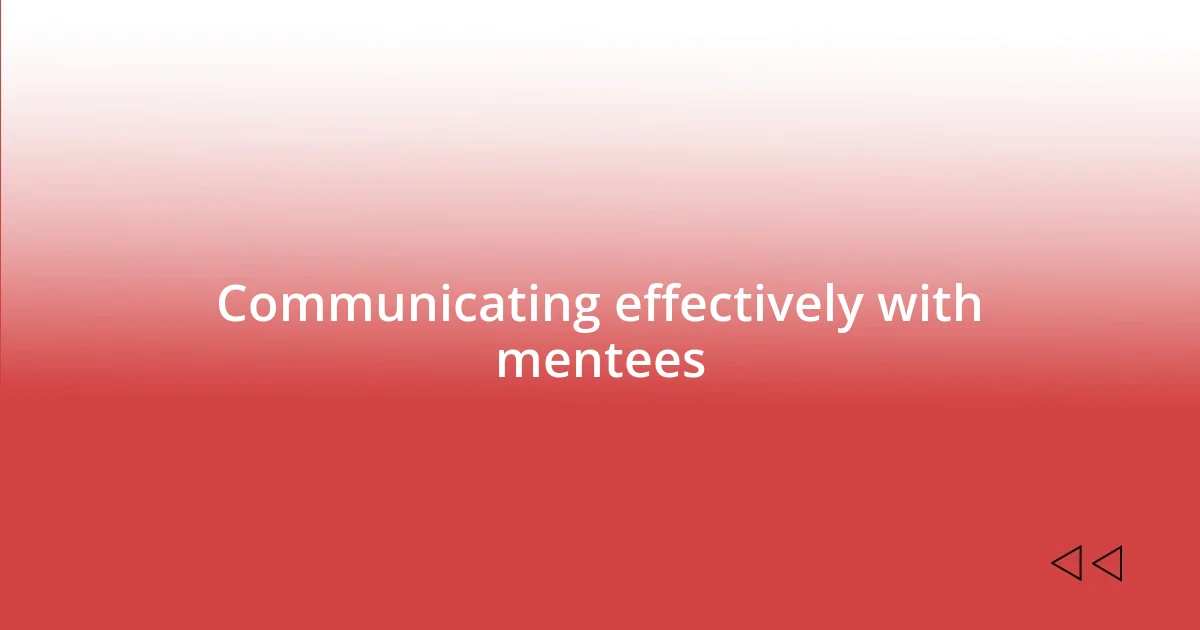
Communicating effectively with mentees
Effective communication with mentees is about more than just exchanging information; it’s about building a dialogue. I recall a moment when my mentee seemed disengaged during our discussions. Instead of pushing forward, I paused and asked them directly what was on their mind. That simple question opened the door for them to express their concerns and led to a much more productive conversation. Have you ever noticed how just one genuine inquiry can change the course of a discussion?
Listening actively is another essential aspect of communication. I learned this after realizing I sometimes fell into the trap of thinking I knew what my mentee needed without fully understanding their perspective. During one session, I decided to let them speak freely about their challenges. Their insights not only surprised me but also reshaped my approach, allowing me to tailor my guidance more effectively. Isn’t it amazing how much we can learn when we just take a moment to listen?
Nonverbal cues often convey as much, if not more, than words. I’ve been in situations where a mentee’s body language spoke volumes about their comfort level or readiness to tackle certain topics. For instance, I once noticed a subtle tension in a mentee’s posture when discussing a complex project. It prompted me to shift the conversation, exploring their apprehensions. How often do we overlook these silent signals? Recognizing and responding to these cues can create a more open and authentic mentoring relationship.
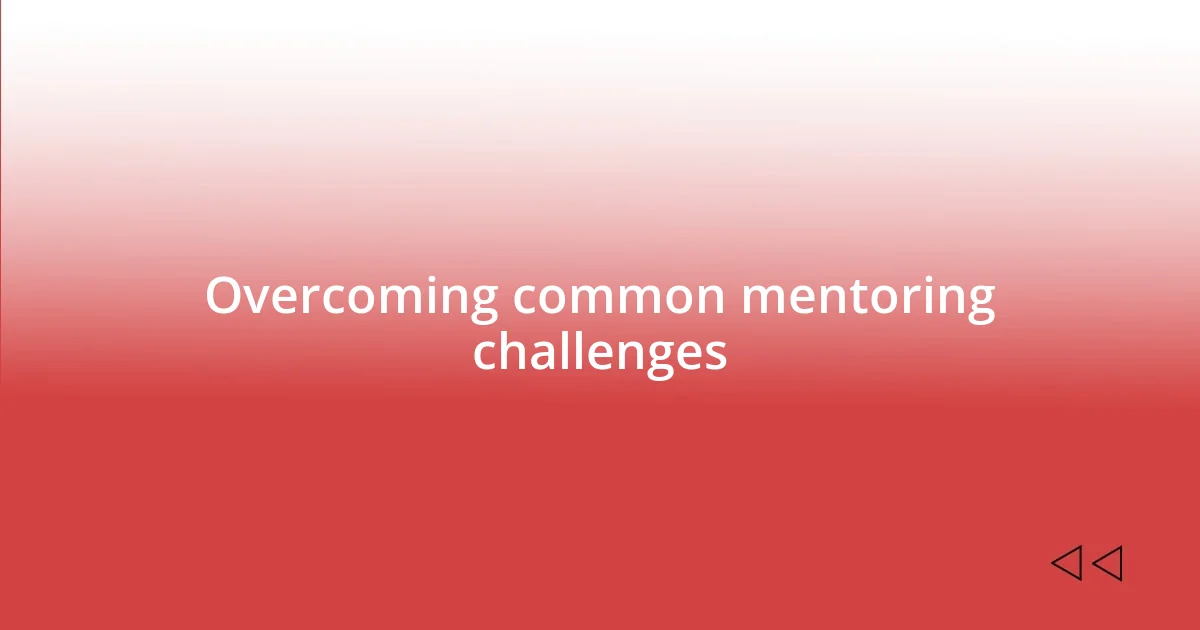
Overcoming common mentoring challenges
Navigating mentoring challenges can sometimes feel daunting, but I’ve learned that embracing vulnerability can pave the way for deeper connections. I remember one of my mentees struggling with self-confidence. Instead of deflecting from their feelings, I shared my own experiences with doubt and setbacks. It was enlightening to witness how that honesty created a safe space for them to open up. Have you ever realized that sharing your own struggles can be a powerful tool in mentorship?
Conflict can also arise, especially when expectations clash. There was an instance where my mentee believed they required a more structured approach, while I thought flexibility was key. Rather than letting this disagreement fester, we sat down to discuss our perspectives openly. By acknowledging our differences and finding common ground, we not only resolved the conflict but also enriched our relationship. Isn’t it interesting how a potential setback, when addressed properly, can ultimately strengthen your bond?
Time management is another hurdle I’ve encountered in mentoring. Early on, I found it easy to overcommit, scheduling too many sessions without considering my own bandwidth. Through trial and error, I learned the importance of balancing my time while still being present for my mentee. Together, we implemented a consistent but manageable meeting rhythm that worked for both of us. Have you ever struggled with juggling commitments? By prioritizing our time and being realistic about what we could accomplish, we fostered a more productive and enjoyable mentoring experience.
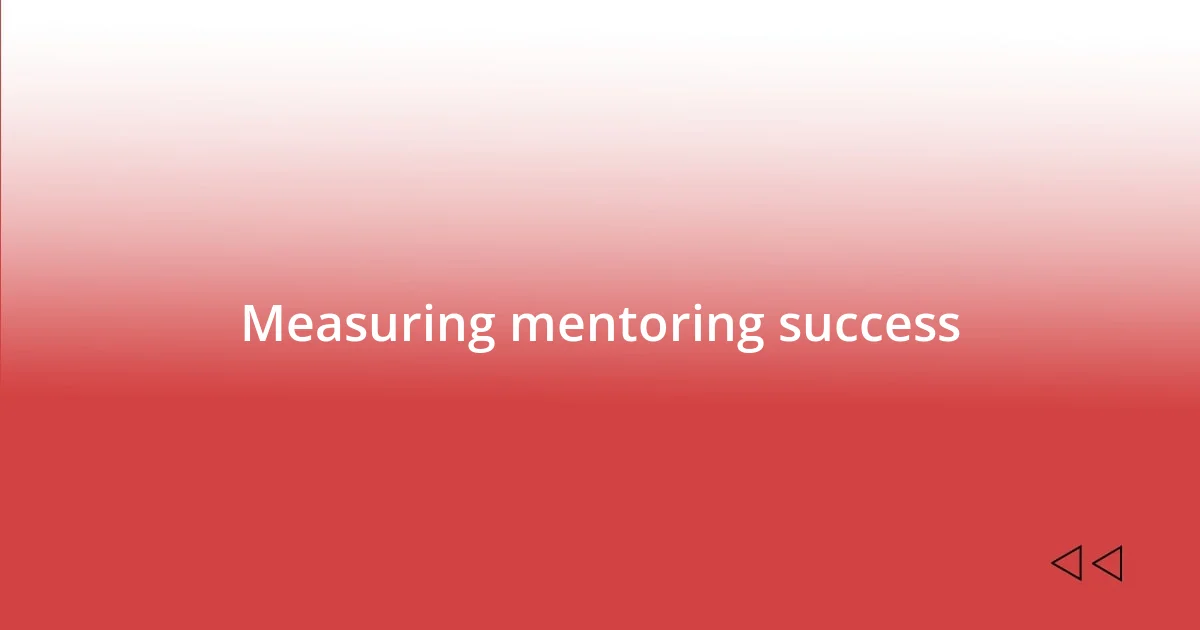
Measuring mentoring success
Measuring mentoring success can often feel subjective, but I’ve found that setting measurable goals makes a significant difference. For instance, during one mentorship, we established clear objectives like developing specific skills or completing a project by a certain deadline. In reflecting on our progress periodically, I recognized how these milestones built both my mentee’s confidence and our rapport. Have you tried setting clear goals in your mentoring relationships?
Feedback is another crucial indicator of success. I still remember a moment when my mentee shared how a particular piece of advice changed their approach to a project. That recognition not only validated my guidance but also highlighted the impact our sessions had on their growth. It made me wonder—how often do we seek out feedback to gauge our effectiveness as mentors? Actively asking for input can illuminate areas for improvement and reinforce the positive aspects of our mentoring journey.
Emotional growth is perhaps the most beautiful measure of mentoring success. I’ve experienced firsthand how witnessing a mentee blossom into a more self-assured individual can be incredibly rewarding. One mentee, who initially struggled with imposter syndrome, went on to lead a team effectively after our time together. Watching that transformation reminded me that success isn’t just about achieving goals; it’s also about nurturing their self-belief. Isn’t it incredible how mentorship can not only change a career path but also shape a person’s entire outlook on their capabilities?
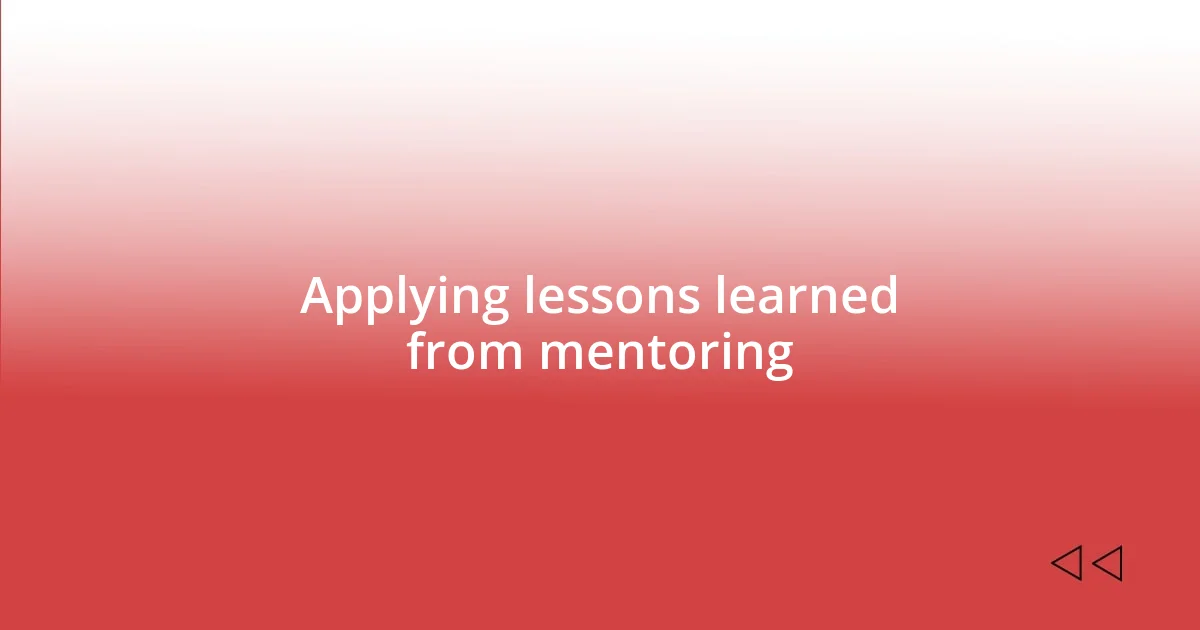
Applying lessons learned from mentoring
Applying what I learned from mentoring has transformed my approach not just as a mentor, but also in my personal life. For instance, after realizing how vital open communication was with my mentees, I began to practice the same transparency in my other relationships. I vividly recall a conversation with a close colleague where I decided to voice my challenges with a particular project. That candid discussion led to a collaborative problem-solving session that not only resolved our issues but deepened our trust. Have you ever considered how embracing openness can enhance your interactions?
Another lesson I found valuable is the power of tailored guidance. There was this one mentee who thrived on constructive criticism, while another preferred a more encouraging approach. The contrast taught me that the key to effective mentorship—and by extension, teamwork—lies in truly understanding individual needs. I often think about how personalizing my feedback can lead to better results. Isn’t it fascinating how adapting our methods can unlock potential?
Lastly, I’ve learned that patience is crucial. In one instance, I was eager to push my mentee towards rapid progress, but I soon recognized the importance of allowing them to grow at their own pace. This realization hit me during a follow-up session where their improvement was more evident than I anticipated. This experience reinforced my belief that sometimes, stepping back allows for greater leaps forward. How often do we overlook the value of patience and reflection in our journeys? It’s a lesson I now apply not only in mentoring but in facing challenges in my own life.










